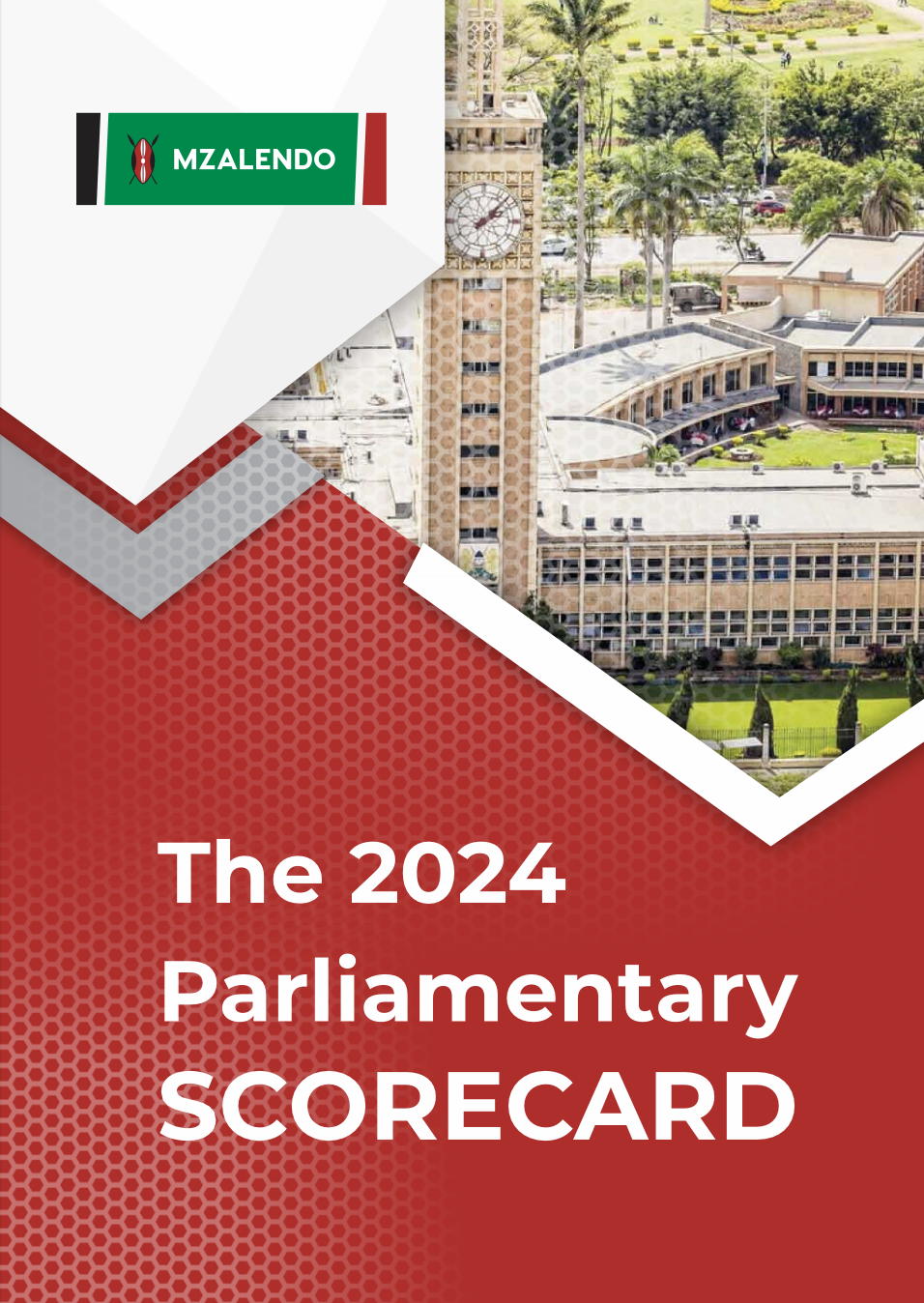Home » Media Centre » Press » Mismatched Priorities: 2024 Scorecard paints a Parliament at Odds with Citizen expectations, demands and priorities

Nairobi, 8th December 2024: Mzalendo Trust, a Kenyan Parliamentary Monitoring Organisation, has raised concerns about the level of Parliament’s responsiveness to issues relating to public interests.
In the 2024 Parliamentary Scorecard, released today, Mzalendo noted the high number of instances of members’ absenteeism from the House, the passage of bills that disregard citizen inputs, voting patterns that do not represent the wishes of citizens and attempts to weaken constitutional provisions through introductions of Bills and amendments to existing legislations.
In a year that has seen Kenyans persistently voice their aspirations and concerns, especially in the legislative process, demanding accountability from Parliament and other arms of government, the failure by Parliament to address these needs should be of concern to the citizens. Despite this awakening, citizens’ voices remain muted in legislative priorities, Parliament has incessantly failed to align its work with electorates’ needs and aspirations, even sidelining citizens’ views in key legislations as was witnessed in the Finance Bill, 2024.
The report notes that public participation remains a challenge, due to the lack of a clear framework on what constitutes meaningful participation. For example, the reports notes discrepancies between the period provided for citizen inputs for different bills, ranging between three days and twenty days in the National Assembly, and three days and twenty-four days in the Senate, depending on the bill in question and the responsible committees. Worryingly, the bills that have elicited high citizen interest seem to attract the lowest participation timelines. The Digital Health Bill, for example, had a public participation window of three days in the Senate, and the Social Health Insurance Bill had a public participation window of seven days in the National Assembly.
“Public Participation, which is often rendered perfunctory by Parliament, continues to be a point of contestation between Parliamentarians and Wananchi. Notably, the Courts’ pronouncements on the need for robust and meaningful public participation, have been met with hostility by some MPs, reflecting a concerning trend where elected leaders disregard the rule of law and voices of the people in favour of expedience,” Mzalendo’s Executive Director, Ms. Caroline Gaita, explains.
Whilst there has been an increase in legislative output this year in the form of Bills, Kenyans' sentiments and needs continue to be pushed to the periphery, especially in key legislations, even when their sentiments on such legislations are clear. In the period under review, one Private Member’s Bill in the National Assembly and two in the Senate received presidential assent, and 20 government-sponsored Bills in the National Assembly and two in the Senate.
Key Bills such as the Finance Bill 2024, the Affordable Housing Bill 2024 and other fiscal Bills, were fast-tracked in the legislative process without taking into account citizens’ needs.
“We have also observed an influx in Bills that threaten to undermine Constitutional provisions, especially the Bill of Rights, the national values and principles as elucidated under Article 10 of our Constitution, and edicts of Chapter six of the Constitution. These Bills do not in any way proffer the needs, aspirations and interests of Kenyans,” Ms. Gaita noted.
Notable Bills that upset provisions of the Constitution of Kenya that have been tabled in the House in this period under review include, The Land Laws (Amendment) (No.2) Bill of 2023, The Assembly & Demonstrations Bill of 2024, the Anti-Corruption & Economic Crimes (Amendment) Bill No. 40 of 2023 and the Anti-Corruption & Economic Crimes (Amendment) Bill No. 30 of 2023. The Constitution of Kenya (Amendment) Bill, 2024 which sought to among other things, increase the term limits of the President, Governors, MPs and MCAs, also received a lot of rebuffs from Kenyans.
“These bills have been tabled in a period where Kenyans continue to grapple with the high cost of living and a harsh business environment, unemployment, a healthcare crisis with doctors’ strikes, medication shortages and a dysfunctional SHIF, Human Rights violations including abductions, arbitrary arrests and unexplained murders, poor disaster management (particularly flooding) leaving thousands of Kenyans vulnerable, alarming cases of femicide among other pressing needs. This shows the growing disconnect between the House of Representatives and their Representatives,” she further notes.
On individual performance during the period under review, the most active MPs in the National Assembly are identified as Hon. Wilberforce Oundo Ojiambo (Funyula), Hon Beatrice Elachi (Dagoretti North), Hon. James Nyikal Wambura (Seme), Hon. Makali Mulu (Kitui Central) and Hon. Adan Wehliye (Eldas). The Scorecard this year has gone further and detailed their contributions on the floor of the House and how they voted on critical issues, including impeachment motions.
In contrast, the number of MPs who have not spoken this year is slightly higher compared to last year's Scorecard, from 19 MPs to 20 MPs with more a half of the House having spoken less than ten times. Among the perennial non-speakers include the Kapseret MP, Hon. Oscar Sudi (Kapseret) and Makadara MP, George Aladwa, whose silence on the floor has become emblematic of a lack of substantive engagement by some elected representatives.
Despite their silence, many of these members voted on critical Bills, including those affecting health, housing, taxation, and impeachment motions.
The most active female MPs are Hon Beatrice Elachi (Dagoretti North) Hon. Zamzam Chimba Mohammed, (Mombasa County Women Rep.) Hon. Catherine Omanyo Nakhabi,(Busia County Women Rep.) Hon. Dorothy Ikiara, (Nominated) Hon. Jane Njeri Maina, (Kirinyaga County Women Rep.). Hon. Jane Njeri Maina, (Kirinyaga County Women Rep.) Hon. Cynthia Muge, (Nandi County Woman Rep), Hon. Gitonga Mukunji (Manyatta), Hon. Robert Mbui, (Yatta) and Hon. Charles Nguna (Mwingi West) lead the list of most active young MPs.
In the Senate, the most active Senators are, Senators Samson Cheragei (Nandi), Senator Eddy Gicheru (Migori), Senator Tabitha Mutinda (nominated), Senator Erick Mogeni (Nyamira) and Senator Gloria Orwoba (nominated).
Categories: Accountability Oversight eye on Parliament 2024 Parliamentary Scorecard
You must login to comment
There are no comments.